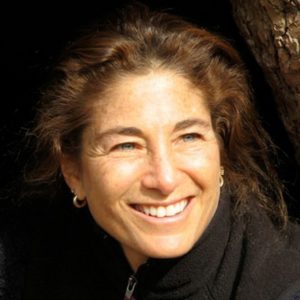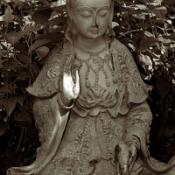 Tara Brach, PhD, clinical psychologist and peace activist, is one of the most widely respected teachers of Buddhist meditation and spiritual awakening. Her teachings, which blend Western psychology with Eastern spiritual practices, focus on careful attention to inner life and compassionate engagement with the world. The result is a distinctive voice in Western Buddhism that encourages people to mindfully approach freedom from suffering as individuals and societies.
Tara Brach, PhD, clinical psychologist and peace activist, is one of the most widely respected teachers of Buddhist meditation and spiritual awakening. Her teachings, which blend Western psychology with Eastern spiritual practices, focus on careful attention to inner life and compassionate engagement with the world. The result is a distinctive voice in Western Buddhism that encourages people to mindfully approach freedom from suffering as individuals and societies.
The founder and senior teacher of the Insight Meditation Community of Washington DC, Tara focuses on bringing practices of mindfulness to prisons and schools as well as issues of diversity, peace, and environmental sustainability. Tara teaches Buddhist meditation at several centers in the US and Canada, including Spirit Rock Meditation Center in California, the Kripalu Center, and the Omega Institute for Holistic Studies. She also helped create the Washington Buddhist Peace Fellowship. In addition to numerous articles, videos, and recorded talks, Tara is the author of the books Radical Acceptance, published in 2003 and True Refuge: Finding Peace and Freedom in Your Own Awakened Heart.
In an exclusive interview with CEO and founder of GoodTherapy.org, Noah Rubinstein, marriage and family therapist, Tara shares her inspiration for Radical Acceptance and True Refuge and discusses how Buddhist teachings have helped her as both an individual and mental health professional.
For your new book, why the title True Refuge? [W]ho did you have in mind when you wrote it?
I love the language of True Refuge because it feels like this reality that each of us has this longing to be at home in our bodies, our hearts, with each other, and in the world. We’re seeking that sense of belonging. We come into this world, and there’s a lot of uncertainty. I think about William James, who wrote that every religion starts with the cry “help.” [O]n some level, we get we’re mortal, so something in us wants to find some way to be at peace. True Refuge refers to that experience where we’re not holding on to substitutes or numbing ourselves, we’re entering reality in a way that allows us to truly find a sense of harmony.
You were talking about different cries for help that cause people to look for refuge, and I think people would be interested to know what your cry for help was, how that brought you to this work, and influenced your awareness and growth.
Well, the cry for help that got me to write Radical Acceptance was this realization. I had it when I was camping with an older, wiser friend. But my friend said, “You know, I’ve learned to be my own best friend,” and I realized I was the furthest thing from that—I was at war with myself. I have discovered it’s probably the most pervasive suffering we Westerners have, sensing something’s wrong with us. That in some way we’re deficient. And writing Radical Acceptance was from what I was learning working with myself and others about how to trust our basic goodness, and stop being at war with the natural ways our egos express themselves.
The second was not long ago, when I got diagnosed with a genetic disorder that affects mobility and connective tissue. I went from being athletic and loving being outside, to not being able to swim anymore, to run, walk up inclines. I particularly remember one incident, when friends and family went to the beach without me because I couldn’t walk on sand, and it was one moment where I could feel the loss of everything I was loving, and there was that cry “Help, may I love this life no matter what? May I find refuge that can allow me to be with this world no matter what happens?” And that was the beginning of True Refuge, finding my way to a sense of being that is timeless, that doesn’t depend on being able to swim in the ocean.
True Refuge refers to that experience where we’re not holding on to substitutes or numbing ourselves, we’re entering reality in a way that allows us to truly find a sense of harmony.
I appreciate you telling that story about losing your mobility. I love that you walked away from this wanting to love life no matter what. [W]hen you talk about the heartache and loss people go through, how can anyone in those situations love their life no matter what? Is there a way to sum up how you do that?
I want to deepen the word “love.” The feeling is not joyful celebration in the beauty of life in that moment. It could be a feeling of the most profound heartbreaking compassion, like holding with infinite tenderness the pain and grief that’s here. [L]oving life no matter what doesn’t mean we don’t truly grieve. It means we stay open to that grieving process, and in that openness, we sense something timeless.
That’s what True Refuge is. It’s beyond our ego self, beyond the emotions. It’s that space of awakeness, tenderness, and openness that might be described as spirit. But the truth is, we lose everything, and we know that. We can celebrate the mystery that’s here, without having it stay the same in a way that keeps us secure.
I guess this makes me wonder how some of these issues are addressed in True Refuge.
[W]e all have different versions of feeling disconnected. And some people feel disconnection because their bodies are sick, there’s a sense of losing connection with living. And for some, the sense of what’s going on has to do with depression or anxiety, feeling disconnected because they’re caught in fear. So, how do we come back to a sense of connection?
[T]he book offers what I call “perennial teachings,” which you find in spiritual traditions that have to do with “Who are we really?” [H]ow do we go beyond that sense of a deficient self and realize more of that love and awareness that expresses our wholeness? And the book has three gateways to a feeling of wholeness, and they each include contemplative practices that help wake us up. And one of them I call “truth,” the gateway of presence, that we learn how to contact the present moment. [T]he second archetypal gateway is love, that we discover what allows us to feel loving connection with each other and our own aliveness. And the third gateway is awareness, which is formless, pure consciousness. It’s always here, but we get so caught in our plans and worries, we forget the stillness that’s aware of sensation. So, these three gateways have different trainings that help us wake up to them. They’re completely interdependent and very practical.
[I]n chapter one of Radical Acceptance, you describe your ambition to become wiser and free, and how when you would ask your teacher, “What else can I do?” it would lead to your teacher telling you to relax. And it makes sense that giving up on becoming enlightened can lead to enlightenment, but how does one become spiritually enlightened without trying?
I love that question because in spiritual communities, one of the deepest inquiries is “What does it mean to make a wise effort?” I went into spiritual life in a competitive, achievement-oriented context, and it took a while to loosen up on that. But it takes a sincere longing to be who we are. It catalyzes us and keeps us moving when it’s difficult, in contrast to the kind of striving that says, “Something’s wrong with me,” which never works.
I’ll share the story of the Buddha’s most devoted disciple, Ananda. Ananda worked strenuously at becoming enlightened. [A]fter the Buddha dies, there’s this council of enlightened monks planning to hold council, but Ananda is not allowed to come because he hasn’t been enlightened. So, he decides the night before he’s going to practice vigorously. But in spite of his efforts, he makes no progress because he’s striving. [B]efore dawn, he’s exhausted. He decides to let go and relax, and as he lies back, he becomes liberated.
[T]he moral of the story is not simply lying back and resting, because he had to spend decades training. [H]e was very awake in many ways, but the final step was to let go of striving. I think we commit to training our attention because neuroscience is telling us we have neuroplasticity. We can create fresh pathways in our brain that lead to peace, happiness, and freedom. [T]he ultimate realization comes when we relax back into what we already are, not when we try to be different.
[L]oving life no matter what doesn’t mean we don’t truly grieve. It means we stay open to that grieving process, and in that openness, we sense something timeless.
I’m wondering what you think needs to change socially, culturally, or internally that would encourage seekers and non-seekers to stop looking for redemption outside of themselves, to be okay with who they are?
[W]hen I do a workshop on Radical Acceptance, I say, “Well, what stops you from accepting yourself as you are?” The most common response is fear that if I accept myself, I’ll never change. In fact, maybe I’ll get worse, be stuck being a defective, deficient self, and never be happy. [T]here’s this belief I need to be different to be loved. I think for most of us, the healing work has to do with seeing the belief we’re carrying about ourselves that something’s wrong, and to hold that pain with compassion. And we start getting how many life moments we’ve been deprived of because we believed something was wrong. We start sensing who we are beyond that.
[I]t reminds me of what I love most about psychotherapy, the moment somebody shines their own light of self-compassion on part of themselves they used to not like, and how healing it is to get that from one’s self. [O]ne of my teachers, Dick Schwartz, has said if you put aside judgment and witness a part of yourself with curiosity, you’ll discover the part has a positive intention. [R]egardless of the damage the part is causing, it’s been trying to help. I’m wondering in your work going to these deep places with others, if you’ve found all parts are fundamentally good in that sense?
I think Dick is right. The most basic equipment of our survival system—fight, flight, freeze—is so we can flourish, even when the parts get twisted. So rather than putting up boundaries when we need to, we’re constantly defending.
[I]n Radical Acceptance, I told a story of one woman who had been sexually abused by her father, and as part of her therapy process, had a fantasy of being this young child in a closet calling for help, terrified, and needing protection. This fairy appeared and said, “I can’t right now take away the pain, but what I can do is help you not feel it until you’re able to re-digest it, and then respond in a way that’s helpful.” So she disconnected from her body, and ended up having an eating disorder and a hard time with intimacy, and remembering that story helped her realize her eating disorder and shutting people out were coping strategies that were the best she could do as a young child dealing with intolerable pain.
I feel recognizing the positive intention is an essential part of seeing the truth of how we respond to wounding, and instead of adding blame for the way we deal with it, holding it with compassion.
I’ve always been fascinated with the duality between being attached to something we love, and trying to find that detached place, in terms of the Buddhist way. I wonder if you have any thoughts about how we can love something so much and know it’s not permanent, that what we feel will change and be taken away.
It feels natural we are profoundly attached to the beings around us. I think of my son. I want things to be good for him, and when things aren’t going well, I get upset. [T]here’s attachment, and also a mindfulness that watches the attachment, that forgives it for being there. [I]t’s important to forgive, to have our hearts not hold onto blame for our humanness. And there are many moments when I can sense this light of spirit that shines through him, and something in me knows no matter what happens to his bodily being, there is this timeless connection and goodness that can’t die.

The preceding article was solely written by the author named above. Any views and opinions expressed are not necessarily shared by GoodTherapy.org. Questions or concerns about the preceding article can be directed to the author or posted as a comment below.


 Mindfulness Meditation: Awakening the Heart to Compassion
Mindfulness Meditation: Awakening the Heart to Compassion Ethical Discipline: Using Positive Intention to Reduce Guilt
Ethical Discipline: Using Positive Intention to Reduce Guilt Having Trouble Getting Unstuck? Find Self-Compassion
Having Trouble Getting Unstuck? Find Self-Compassion

Please fill out all required fields to submit your message.
Invalid Email Address.
Please confirm that you are human.
Leave a Comment
By commenting you acknowledge acceptance of GoodTherapy.org's Terms and Conditions of Use.